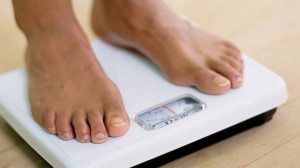
Source: ABC News
Originally published on Body Love Wellness and cross-posted here with their permission.
The desire to be thin is so ingrained in our culture (thanks, $58.6 billion diet industry) that we don’t often ask the question, “Why do you want to be thin?”
But what does being thin really mean? What would being thin mean to you?
People often talk about thinness and the desire for thinness as a given.
We are taught to equate thinness with health, attractiveness, ease of dating, and so on. We’re taught that being thin is a worthy goal, the holy grail of a life well-lived.
So I want to break apart this thinness myth right now.
I want to look at the reality of our collective desire to be thinner, how we’re taught to achieve it, and how using a Health At Every Size approach (the one I use with my clients) can help you achieve the desires underpinning your thinness desires.
Let’s look at nine supposed benefits of being thin and break down the dieting approach versus the HAES approach. And I’ll let you decide which one sounds better.
1. Better Health
More and more evidence is showing that the supposed detrimental health effects of being fat are actually the result of dieting and the incredible strain that dieting puts on the body.
Dieting wreaks havoc on the body, affecting everything from your immune system, to your cardiovascular system, to your mental health.
Participants in studies of the Health At Every Size approach, which includes intuitive eating skills, appropriate body movement, and body acceptance, actually show more long-term improvement in health indicators, such as decreased LDL cholesterol and blood pressure, more consistent activity levels, and feeling empowered and less depressed.
2. More Attractive
A 2004 study of chronic dieters found that they had lower self-esteem and a lower appearance evaluation than non-dieters.
In other words, even if temporary thinness is achieved with dieting, it doesn’t mean that the dieter feels any more attractive.
On the other hand, participants in HAES programs learn to love and accept their bodies, increasing their self-esteem and acknowledgement of their attractiveness.
When you feel attractive, others respond to it, and therefore see you as attractive.
3. More Active
For dieters, activity is often connected with weight loss. The focus is not on joyful movement of your body, but on calories burned.
This focus on activity as a means to an end often leads to abandonment of exercise programs when desired results aren’t achieved, or overexercising, which can result in injuries and other problems.
With the HAES approach, participants are encouraged to find movement that they like.
Because it’s enjoyable, they’re automatically encouraged to continue. Linda Bacon’s study has borne this out.
4. Live Longer
A recent study found that people who lost 15 percent or more of their body weight had an increased risk of death compared to people of the same size who didn’t lose weight.
Our common knowledge on this topic is completely off base.
Studies indicate that fat people live longer than thin people.
HAES does not involve this intentional manipulation of body weight, and therefore doesn’t create these detrimental effects.
5. Eating Better or Healthier
It all depends on your conception of healthy eating.
Dieting often involves a disconnection from your body, and an implicit agreement to adhere to the dictates of the diet no matter what sort of cues your body gives you.
So while you may be eating more reasonable portions and more vegetables, you’re also learning to ignore your body’s signals, which usually leads to some bingeing behavior when your body calls bullshit.
Also, most diets involve some low-fat or low-cal processed foods that are full of chemicals that probably should not be ingested by anyone.
With HAES, you learn about real nutrition, you eat real food, you reconnect with your body, and you learn how to listen to its cues and feed it in a way that makes sense for you.
You learn to trust yourself and your body.
You have bigger portions when you need them and smaller portions when you need them.
You let go of restrictions in a new way, so that food loses its power and becomes what it is — nutrition, fuel, pleasure.
6. Easier to Find Clothes
It is true that, if you diet down to a size 14 or under, it is easier to find and buy clothes.
However, because diets don’t work in the long term (I’m sorry, but they really don’t), dieting leads to size fluctuation, which means that you end up with a wardrobe of lots of different sizes, costing you more money, time, and aggravation.
It’s true that it’s still harder to buy plus-sized clothes, mainly because so many retailers are online only.
However, learning to trust your body raises your chances for staying a consistent size, which means that those pants that you loved and bought two years ago may still fit you for a while.
Plus, plus-sized fashion has come a loooong way in recent years. (Check out some of my favorite options here.)
7. Easier to Date
It’s true that it may be easier to date when you’re a smaller size. I don’t know the statistics, but it may be true.
But, again, because weight loss via dieting is temporary, you may be feeling the stress of trying to stay thin to stay with a particular partner.
And because dieting has a negative impact on body image and feeling attractive, you might not be enjoying dating so much anyway.
With HAES, you learn to trust and love your body.
You appreciate it, you approve of it, you come to terms with your imperfections, and you locate and connect with your attractiveness.
When you feel good in your body, you feel more attractive, and the more attractive you feel, the easier it is to date and really enjoy yourself.
8. Less Judgment by Others
It’s true that society judges fat dieters as doing the right thing by “doing something” about their weight.
However, society is wrong.
Plus, dieting to improve other people’s judgment of you is a detrimental, approval-seeking behavior. Over-emphasis on others’ opinions of you is a key factor in low self-esteem.
When you operate from a HAES perspective, you become empowered.
Your self-esteem stabilizes because you provide your own approval of yourself. Other people’s judgments of you based on your size become less important to you.
9. Less Discrimination
It’s true. Fat people are discriminated against, and it’s been getting worse in the last few years.
But dieting down to temporary thinness to avoid discrimination is not the answer.
Discrimination based on your size is not okay.
The more people adopt a HAES approach, the more we will have empowered people of all shapes and sizes who won’t find discrimination acceptable.
The more that we are educated on the realities of fatness, the more we’ll be able to effect change.
***
To put all of this really simply, dieting promises a lot and delivers almost nothing.
HAES actually delivers on most of the promises of dieting.
If you want to feel consistently good about yourself and improve your health, the choice is very clear.
***
Want to learn more? Then check out Golda’s upcoming course starting on April 3, 2014:
[ultimatesocial_facebook custom_class=”fb-btn-us”] [ultimatesocial_twitter custom_class=”tw-btn-us”]
Want to discuss this further? Login to our online forum and start a post! If you’re not already registered as a forum user, please register first here.
Golda Poretsky is a certified holistic health counselor and founder of Body Love Wellness, a program designed for plus-sized women who are fed up with dieting and want support to stop obsessing about food and weight. Follow her on Twitter at @bodylovewellnes. Read her articles here.
Search our 3000+ articles!
Read our articles about:
Our online racial justice training
Used by hundreds of universities, non-profits, and businesses.
Click to learn more
Most Read Articles
- « Previous
- 1
- …
- 30
- 31
- 32



















